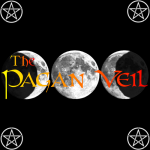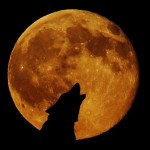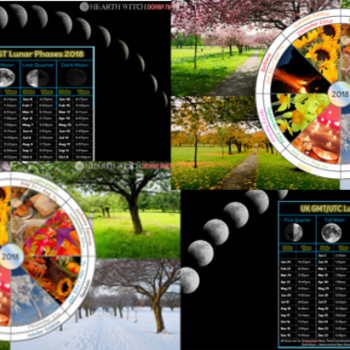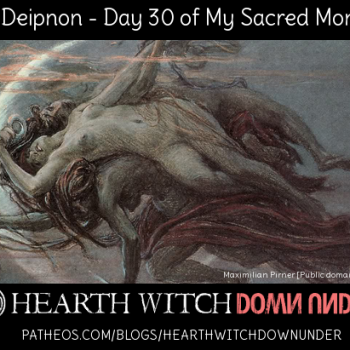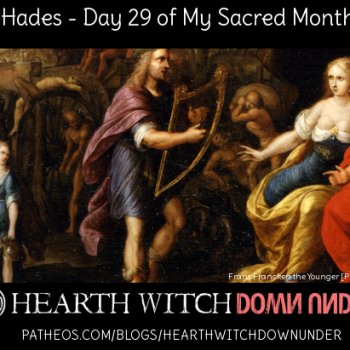There are two (at least) ways that Pagans can and sometimes do bring their ancestors into their religion, or even focus their religion around their ancestors in some way.
The first, which has origins in many native religions and cultures, Asian religions and cultures but also many of our own “dead” pagan religions, is the concept of ancestor veneration, worship and/or appeasement.
The second way, which can be seen as a bit contentious, especially if you suggest someone does this – is the idea of following the religion of your ancestors.

Ancestor Veneration
Examples of ancestor veneration are best seen in the various Asian religions, Hinduism and Buddhism being the best known ones, and therefore easiest to study. It exists in other religions as well, including the Celtic religion/s and somewhat in the Germanic/Norse beliefs.
There are several trending or common reasons why people would and do practice ancestor veneration, some of these reasons will exist within a single religion.
Honour and Remembrance
The most easy to see and understand is the idea of simply honouring loved ones, including those we may not have met, and using ancestor veneration as a way of remembering them and preserving their memories.
Appeasement
In many of the traditions there is a theme of appeasement. This is especially relevant at specific times of year, and is why we see death festivals in so many cultures – the Feast of the Hungry Ghosts and Samhain being two examples of this.
By venerating and honouring our ancestors we help to ensure that, during these liminal times, the ghosts of our ancestors will not come to harm us. This is generally done with offerings of food, sacrifice, decorations, feasts in their name (and a place set for them), dances and music, among other things.
Protection and Fortune
This too is a form of appeasement, but for the opposite reason than that above (though it can exist simultaneously within a single religion). In this we honour our ancestors and give them offerings so as to help encourage their protection of our home and family. Sometimes it goes further and our ancestors can directly influence our fortune, bringing us good (or bad) luck.
Their Afterlife
In some systems our treatment of the bodies and memories of our ancestors is a direct influence on their afterlife.
In ancient Egypt for example, the state of the body was of extreme importance – as soon as the body decomposed, the spirits would disintegrate. If the catrouche (name plate) was destroyed, or the persons name was simply not written somewhere, the spirits would become lost. This is why mummification was such a big deal, and why desecration of mummies is so abhorrent. Yet one must feel for the poor of Egypt who could not afford mummification and so their spirits died pretty quickly.
In other systems it is more about memory, and offerings. Honouring the memory of and making offerings in the name of your ancestors can give them a richer afterlife, with better food and drink, or in the cases of karmic debt, it can help to repay their karmic debt and perhaps get them a better reincarnation next time.
Leaving food, drink and other items at the gravesite of your ancestor can also ensure better material goods in their afterlife.
Your Afterlife
In the same way that you can help improve the karmic debt of your ancestors through offerings and veneration, you can also improve your own future afterlife. The concept of charity to improve your own lot, is not an unknown concept after all. And it is true in the case of ancestor veneration as well.
Reincarnation
This is touched upon with the idea of bettering an ancestors afterlife, but it also exists outside of the Asian religions, away from the concept of karma. In some Native American tribes the belief exists that honouring an ancestor (or other family member, such as recently deceased babies) through naming a new child the same as the deceased person, the deceased persons spirit would be reborn into the new life. They would not necessarily be a carbon copy of the deceased person, but certain attributes would be obvious.
Ignorance
In some religions, including some Australian Aboriginal and Native American tribes, the best thing to do is venerate your ancestors by ignoring them completely. Do not say their name, do not use their name for another person, do not look at photos or drawn representations of them and be sure to treat their bones properly, sometimes even placing them in a cave and walling the cave off. In this way you can keep away an angry ghost, stop a ghost from becoming sad, despondent and overly attached to life or stop a ghost from becoming demonic.
As you can see there are many reasons that some people venerate their ancestors and it exists within a large number of religions and cultures.
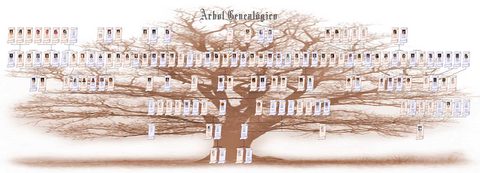
Ancestral Religion
Ancestral Religion, this is the idea that we should be following the religions of our ancestors, rather than a religion that is not part of our ancestral heritage. *
This can be a contentious idea for a few reasons.
* It has been pointed out that this phrase is worded badly. I am in no way saying that this is what ancestral religion actually is – this is not its definition. It is merely a commonly held view in certain circles of Paganism, Heathenry and pagan-related groups. The real definition would be more, “the religion or beliefs of our ancestors.” Following your ancestral religion would be simply that, following the religion of your ancestors. No specific reasons are inherent in this practice. But for the purpose of this post, I am discussing the idea that we must follow our ancestors religions and not follow religions we don’t have “blood rights” to follow.
Racism and Assumption
Someone comes looking at a religion, you see them and make an assumption about their race and suggest they seek out their ancestral religion – or you simply wonder, aloud, why they are looking outside of their ancestral religion.
This isn’t always intentional racism, often it’s simply an innocent assumption based on looks and perhaps stereotypes. But, in that, making an assumption based on someones looks (skin colour generally) is not only racially based, but can be completely wrong. Imagine you suggest to a black person that they seek out some African system…. And they turn out to be Australian Aboriginal. You suggest to the Asian they seek out Hinduism or Buddhism… But their ancestral country is thoroughly Islam. You suggest to the white person they seek out some European religion…. But they are actually African, they just look like their white grandparent.
So even if you don’t intend to be racist or racially motivated by your suggestions and wonderings.. You can still come across like a complete idiot for making assumptions based on a persons skin colour or other physical characteristic.
Which Ancestors Anyway?
This is the biggest question really. Which ancestors should we be following the example of anyway? This is especially difficult to do for some of us.
Personally I descend from the following (that I know of, one of my family lines we simply cannot track!). English, Irish, Scottish, Welsh, Cornish, Australian Aboriginal and Bajan (native or slave and white). As I said, we cannot trace one of the family lines – my paternal grandmothers line, past her parents, it just vanishes. We know they were British, and that’s it.
So I know this much – I have some pretty high chances of some Celtic heritage. Obviously some Aboriginal and Bajan (but I am not sure if that is African or Native American), and I am not sure of which Aus Aboriginal Tribe/s I descend from either. One of my family members has the family history information, but she keeps “forgetting” to send it to me. So that’s fun. It also means, I cannot find out which of our ancestors it was that, they tell me, was executed for Witchcraft in England during the Inquisition.
I am also descended from convicts, colonists and Christian Missionaries (who are actually well praised by the Aus Aboriginals of that area). My children are also German, their grandmother is German (but also completely Australian).
So which ancestors? I have a few to choose from don’t I? Celtic, Aus Aboriginal, Bajan, Christian. My kids could be Heathens! What do I choose?
The Gods Call Who They Will
And yet I am mostly Hellenic, with perhaps no Greek lines at all. Because the Gods call who They will and who are we to gainsay Them? Well, obviously we can refuse Them. But you cannot refuse Them to me.
But this can be a contentious stance as well. For some religions, the idea of the Gods calling to people outside of the ancestral lines is, well, blasphemous I suppose. This is apparently true within Heathenism*, where the people are, in some way, descendants of the Gods! So, not being of that line, you cannot be called by Them.
*Try not to quote me on that though, I don’t have enough knowledge of Heathenry to say this is true, but it is said by some Heathens.
The above has some detractors, the idea is that it is not impossible for the Aesir to call on people who are not of the right ancestral lines – I guess for spreading the religion and growing numbers? I only have my Hellenic perspective, which says, the Gods will take everything and everyone because they are greedy. So, to me, the idea that Aesir and Vanir would have two different types of people they call on, one for purity purposes and one for growth purposes, is not something that seems wrong to me. But, my view is distinctly Hellenic.
I would also point out that just because we mortals cannot see an ancestral line, doesn’t mean the line doesn’t exist and that the Gods cannot see it. As I have demonstrated personally, I have a line that we can’t trace back any further than my great grand parents! My kids paternal grandfather was adopted so we have no idea of their lines. We also know basically nothing of my own mothers biological father. My ancestry is a mystery in some cases.
Perhaps we can’t assume that everyone “called by the Gods” was actually called by the Gods, but it’s not something we can prove either way. Certainly my Gods never tell me about Their dealings with other people – why would They? It’s not my business, and even if I think it’s important for me to know, doesn’t mean the Gods will agree with me*. But perhaps other Gods are different, the Aesir may communicate such knowledge. Still, I wouldn’t assume that lack of proof of ancestry is necessarily proof of no ancestry.
*Though, I don’t doubt it would be communicated loudly if someone popped up claiming to be the Oracle of all Olympus and all Hellenes must now follow their rules. Pretty sure our Gods would confirm or deny that person to all of us.
Should You Follow Your Ancestors?
This would be up to the individual wouldn’t it? But also the Gods, or spirits or perhaps even the ancestors themselves would have some input.
In my opinion, ancestry shouldn’t be ignored off the cuff. It is worth looking into and considering the idea of following your ancestral religion/s. But at the same time, I totally advocate that people don’t follow a religion that doesn’t call to them, fit them, help them, work for them. Even if the Gods of your ancestors call to you, if you can’t feel any faith in the religion itself, it may be best to deny Their call. They do sometimes abide by consent and personal sovereignty, it may take a while in some cases – an annoying while in fact – but it can be done.
This is an issue that only you can figure out for yourself. You can read blogs and books and get advice from other people, those of the religions you are looking at. But only you can make that decision. And don’t make your decision purely based on how others may react to your decision. Just because you can’t find your Heathen ancestral lines, just because a number of Heathens will try to deny you – doesn’t mean you should ignore Heathenry if it or the Gods call to you. You may just have to get used to being not welcome among certain other Heathens, but you will be welcome among others.
The same is true of any Pagan religion. There may well be people who think you shouldn’t be in the religion, but there will always be others who are just like you – unwelcome by many, but carving out their own place. Therefore, there will always be allies.
I don’t necessarily advocate choosing a religion you “shouldn’t” but I recognise that sometimes it is the only choice you can make, and I won’t gainsay it. My advice is to deeply research and search (meditate and whatnot) before you make a decision. Then you can argue your case if or when it becomes necessary.
But I also caution respect for the original adherents of a religion, especially a current culture, such as with Native Americans and Aus Aboriginals. It’s one thing to choose a “dead” religion with oft ignored Gods or entities, it’s another to try to take from a living religion and culture that may take exception to your choice.
So personal choice and respect of others. It’s a fine line, and only you can decide where that line is.
Are or were your ancestors a consideration when you “chose” your religion?

